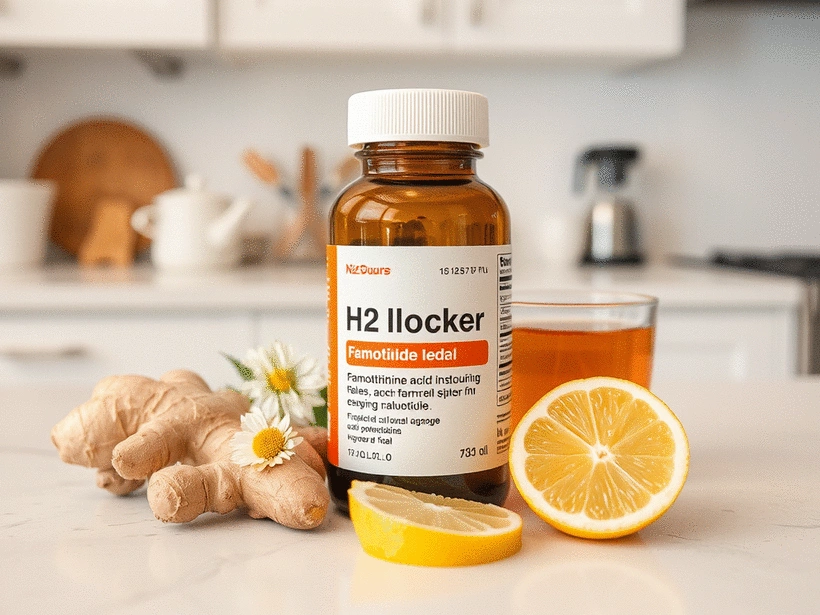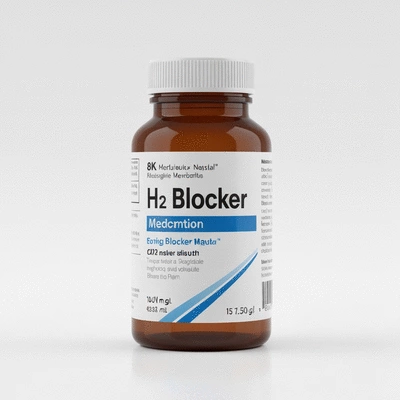H2 Blockers for Acid Reflux Relief

Have you ever wondered how a simple class of medications can offer relief from that persistent burning sensation known as acid reflux? H2 blockers, often overlooked, play a critical role in managing symptoms effectively. Let’s uncover what you need to know about these medications and how they can help you reclaim your comfort.
What You Will Learn
- H2 blockers are effective medications that reduce stomach acid production, providing relief from acid reflux symptoms.
- Popular H2 blockers include ranitidine, famotidine, and cimetidine, each with unique characteristics and benefits.
- Understanding the differences between H2 blockers and proton pump inhibitors (PPIs) is crucial for choosing the right treatment strategy.
- Recognizing GERD symptoms early can lead to better management and improve your overall digestive health.
- Informed use of H2 blockers, including adherence to dosage and timing, is essential for maximizing their effectiveness.
- Consulting a healthcare professional is advisable if symptoms persist or worsen, ensuring tailored treatment for your unique health needs.
H2 Blockers: Quick Relief vs. Long-Term Management
This visual compares H2 blockers with proton pump inhibitors (PPIs) across key attributes for acid reflux management.
H2 Blockers (e.g., Famotidine)
- Speed of Relief: Faster results, often within 1-2 hours.
- Duration of Action: Reduces acid for up to 12 hours.
- Usage Scenario: Great for occasional or short-term symptoms.
- Mechanism: Blocks histamine H2 receptors.
Proton Pump Inhibitors (PPIs)
- Speed of Relief: Slower onset, typically 1-4 days for full effect.
- Duration of Action: Longer lasting, up to 24 hours or more.
- Usage Scenario: Better for chronic conditions and frequent symptoms.
- Mechanism: Blocks acid production in proton pumps.
Understanding H2 Blockers and Their Role in Acid Reflux Relief
At What is Acid Reflux, one of the common questions I hear is about H2 blockers and how they can help manage symptoms. In simple terms, H2 blockers are a class of medications that reduce the amount of acid your stomach produces. By blocking histamine, which stimulates acid secretion, they help provide relief from acid reflux and its associated discomfort.
Understanding how these medications work is crucial for anyone dealing with acid reflux. When you take an H2 blocker, it decreases stomach acid for up to 12 hours, making it easier for your digestive system to process food without causing inflammation or pain.

What Are H2 Blockers and How Do They Work?
H2 blockers, also known as H2 receptor antagonists, include popular medications like ranitidine, famotidine, and cimetidine. Their primary function is to inhibit the production of stomach acid by blocking the H2 receptors found in the stomach lining. This mechanism not only reduces acid levels but also alleviates the burning sensation that many people experience with acid reflux. For more detailed information on their mechanism, you can refer to resources such as NCBI Bookshelf on H2 Blockers.
- Ranitidine: Often prescribed for its effectiveness in treating heartburn.
- Famotidine: Known for its fast action and longer duration, making it a favorite among patients.
- Cimetidine: While effective, it may have more interactions with other medications.
By understanding these options, you can better discuss with your doctor which H2 blocker might be right for you. It’s always a good idea to consider your personal health history and any other medications you may be taking.
Common Conditions Treated by H2 Blockers
H2 blockers are commonly prescribed for several gastrointestinal conditions, including:
- Gastroesophageal reflux disease (GERD)
- Peptic ulcers
- Heartburn
- Esophagitis caused by acid reflux
Each of these conditions can significantly impact your quality of life. Recognizing the symptoms early and seeking appropriate treatment can lead to better management of your digestive health. Multifaceted strategies for managing GERD often involve these medications.
How H2 Blockers Compare to Other Acid Reflux Medications
It’s important to know how H2 blockers stack up against other treatments, like proton pump inhibitors (PPIs). While both types of medications reduce acid production, they work in different ways. H2 blockers act quickly and are often used for immediate relief, whereas PPIs are more effective for long-term management of acid-related conditions. For a comprehensive comparison, you can read more about H2 blockers on Healthline.
- Speed of relief: H2 blockers provide faster results.
- Duration of action: PPIs have a longer-lasting effect.
- Usage scenarios: H2 blockers are great for occasional symptoms; PPIs are better for chronic conditions.
Understanding these differences can help you make informed choices about your treatment options, allowing you to take an active role in managing your health.
Identifying GERD Symptoms and When to Seek Treatment
Recognizing the symptoms of gastroesophageal reflux disease (GERD) is crucial for effective management. Common symptoms include:
- Persistent heartburn
- Regurgitation of food or sour liquid
- Difficulties swallowing
- Chronic cough or throat clearing
If you notice these symptoms frequently, it may be time to consult with a healthcare professional. Early intervention can make a significant difference in your treatment plan and overall well-being. Remember, managing acid reflux is a journey, and you're not alone—I'm here to help you navigate it!
We Want to Hear From You!
What has been your experience with H2 blockers? Have you found them effective in managing your acid reflux symptoms? Share your thoughts below:
Frequently Asked Questions About H2 Blockers
- What are H2 blockers?
- H2 blockers, or H2 receptor antagonists, are a class of medications that reduce stomach acid production by blocking histamine H2 receptors in the stomach lining. This helps alleviate symptoms of acid reflux and related conditions.
- How quickly do H2 blockers work?
- H2 blockers typically provide faster relief, often within 1 to 2 hours of taking them, making them suitable for occasional or short-term symptoms.
- What are some common H2 blockers?
- Popular H2 blockers include ranitidine, famotidine (Pepcid), and cimetidine (Tagamet). Each has slightly different characteristics and potential interactions.
- What is the difference between H2 blockers and PPIs?
- H2 blockers offer faster relief and are typically used for occasional symptoms, reducing acid production for up to 12 hours. Proton Pump Inhibitors (PPIs) have a slower onset (1-4 days for full effect) but provide longer-lasting relief, often used for chronic conditions, by blocking acid production more profoundly.
- When should I consult a healthcare professional about my acid reflux symptoms?
- You should consult a healthcare professional if you experience persistent symptoms that don't improve with over-the-counter medications, severe side effects, unexplained weight loss, difficulty swallowing, or any changes in your overall health.
Summarizing Key Insights on H2 Blockers for Acid Reflux Relief
As we wrap up our discussion on H2 blockers, it’s crucial to emphasize the importance of understanding how these medications can play a role in managing your acid reflux symptoms. By being informed about how H2 blockers work, potential side effects, and proper usage, you can take a proactive approach to your digestive health. Remember, knowledge is power, and it equips you to make better decisions regarding your treatment!
The Importance of Informed Use for Effective Symptom Management
Taking H2 blockers without proper knowledge can lead to less effective symptom management. It’s vital to recognize that while these medications can provide quick relief, they should be used as part of a comprehensive treatment strategy. Here are some essential insights to keep in mind:
- Follow Dosage Recommendations: Always adhere to the prescribed dosage to ensure maximum effectiveness.
- Be Aware of Timing: Taking your medication at the right time can significantly impact its efficacy.
- Monitor Your Symptoms: Keeping track of how your body responds can help you and your doctor adjust treatment as needed.
Informed use not only helps relieve symptoms but also minimizes the risk of potential complications associated with improper use.

When to Consult a Healthcare Professional
As a gastroenterologist, I often encourage my patients to consult a healthcare professional if they notice any of the following:
- Persistent symptoms that do not improve with over-the-counter medications.
- Severe side effects or unexpected reactions after starting treatment.
- Changes in your overall health, including unexplained weight loss or difficulty swallowing.
It’s always better to err on the side of caution. Seeking advice early can prevent complications and ensure your treatment plan is aligned with your unique health needs.
Understanding the Role of Prescription Medications vs. Over-the-Counter Options
When considering acid reflux treatment, it’s essential to understand the distinction between prescription medications and over-the-counter options. Here’s a quick comparison:
| Aspect | Prescription Medications | Over-the-Counter Options |
|---|---|---|
| Access | Requires a healthcare provider’s prescription | Available without a prescription at pharmacies |
| Strength | Generally stronger and targeted for severe symptoms | Usually milder, suitable for occasional symptoms |
| Cost | May vary based on insurance coverage | Typically more affordable and easier to obtain |
Understanding these differences can guide you in choosing the best approach for your acid reflux management.
Encouraging Proactive Health Management
Empowering yourself with knowledge about H2 blockers is just one step in your journey toward better digestive health. It’s important to take an active role in managing your symptoms and seeking relief!
Tracking Your Progress and Adjusting Strategies
One of the most effective ways to enhance your treatment is by tracking your progress. Here are a few tips to help you stay on top of your health:
- Keep a Symptom Diary: Note down what you eat, your symptoms, and when you take your medication.
- Review Regularly: Reassess your symptoms and treatment effectiveness with your healthcare provider every few months.
- Be Open to Changes: Don’t hesitate to adjust your strategies based on what you learn about your body.
Such proactive approaches can significantly improve your quality of life while managing acid reflux.
Final Thoughts on Using H2 Blockers for Lasting Relief
In conclusion, using H2 blockers can be an effective strategy for managing acid reflux symptoms when approached thoughtfully. By understanding their role, consulting with professionals when needed, and actively managing your health, you can find lasting relief. Remember, at What is Acid Reflux, we’re dedicated to supporting your journey toward better digestive health. Let's take these steps together toward a more comfortable life!
Recap of Key Points
Here is a quick recap of the important points discussed in the article:
- H2 blockers reduce stomach acid production by blocking histamine, providing relief from acid reflux symptoms.
- Common H2 blockers include ranitidine, famotidine, and cimetidine, each with varying durations and effectiveness.
- These medications are effective for conditions such as GERD, peptic ulcers, and heartburn.
- H2 blockers offer quick relief compared to PPIs, making them suitable for occasional symptoms.
- Recognizing GERD symptoms early can lead to better management and treatment options.
- Monitoring symptoms and consulting healthcare professionals is crucial for effective treatment.
- Informed use of H2 blockers can optimize their effectiveness and minimize complications.








